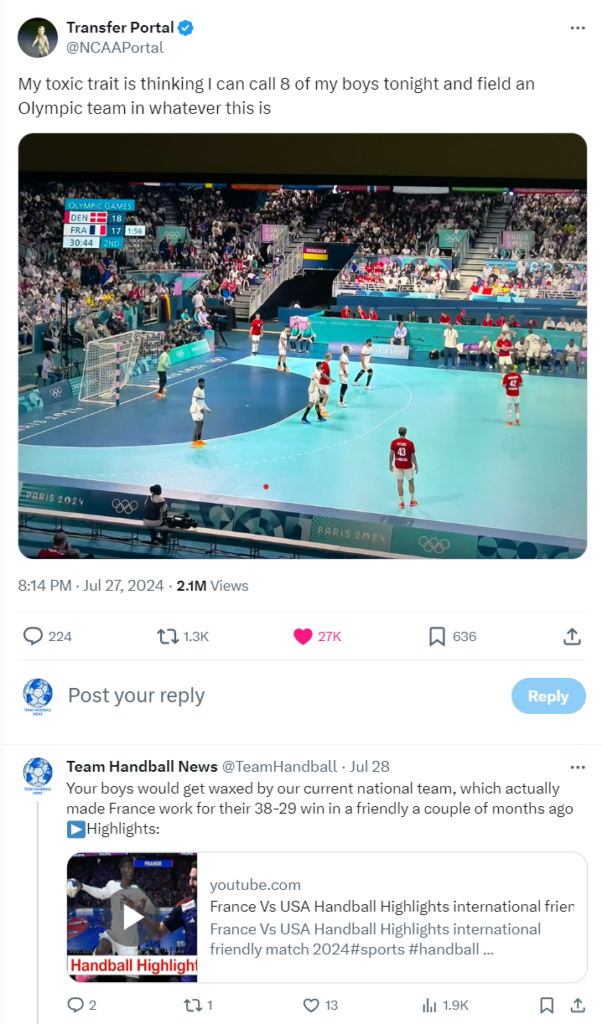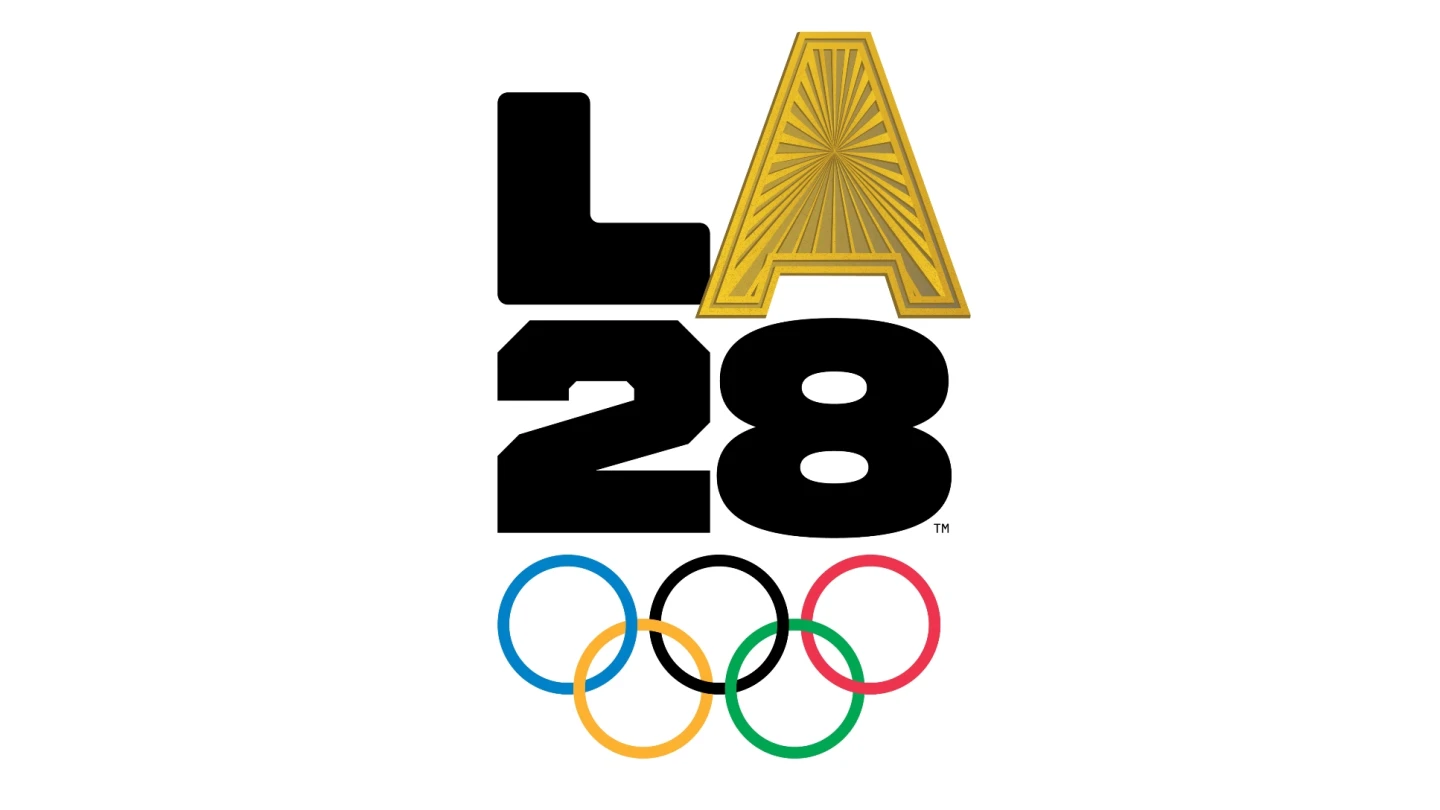This commentary is regarding the U.S. Men’s National team. For information regarding newcomer prospects for the U.S. Women’s National Team (which are dramatically different) check out this commentary.
Olympic Dreams Fueled by Possibilities
I’m sure there are hundreds, if not thousands of athletes watching the Paris Olympics, seeing handball for the first time and thinking, “What an awesome game! I would be great at this sport. Where can I play?”
And, as America’s #1 handball fan, I can tell you that such revelations are music to my ears. There’s nothing I like better than new athletes and fans following in my footsteps. And, no doubt, some of those athletes are probably thinking even grander thoughts, “Hey, the U.S. didn’t even qualify. Hardly anybody probably plays it in the U.S. Maybe I could be an Olympian. How would I go about becoming an Olympic handball player?
For over 25 years the prospects for any American handball player to become an Olympian haven’t been very good. The U.S. last qualified for an Olympics in 1996 as the host nation. And, since then we’ve never really even come close to securing a berth in qualfication events. But, now with Los Angeles hosting the 2028 Olympics that’s about to change. As Charles Barkley would say, it’s Guaranteed that we’re fielding a team. Out there, many are probably thinking… Somebody’s got to make that team. Why not me?
The Wrong Question. Because… You’re not Going to Like my Answer
First things first. Let me be clear. The following is my opinion and certainly not an official USA Team Handball position. That said, I’ve got a pretty good track record of assessing handball in this country. For what it’s worth, here’s my very blunt answer to your question…
As a total newcomer to the sport I would assess your chances of making the 2028 U.S. Olympic Men’s Handball Team are somewhere between 0.0% and .1%. Not 1 percent… but .1%. As in 1 in a 1,000 chance and probably worse than that.
Let me explain further. There are multiple variables to consider and multiple unknowns, but the weight of them all combined leads to the very long odds involved.
The Variables
When one is assessing the prospects of an athlete to take on a totally new sport like handball here are the variables that need to be considered to assess the likelihood of national team success
- The raw talent of the athlete
- The starting age of the athlete and amount of time the athlete has to train
- The training environment the athlete will have
- The quality of the athletes also seeking to make the team
- The commitment level of the athlete
Here’s a closer look at each variable
The Raw Talent of the Athlete
Is it possible to pass judgment on athletes I don’t know and have never seen? Answer: Yes and No. Certainly a talent combine whereby athletes would perform drills that could be measured would be very useful. And, basic scrimmaging even of brand new athletes will likely be a good guage of potential. But, sight unseen the vast sporting infrastructure of the U.S. has already likely binned off your raw talent level fairly accurately.
If you’re a pro athlete chances are you’re not contemplating a new handball career. The same is also true for most NCAA college athletes who are still in college. Mistakes, of course, are made. And, there are athletes who are average in one sport, but can excel in another sport like handball. But, those are the exceptions. Chances are… that you are a good athlete that can develop into a pretty good handball player. It’s less likely, that your a great athlete that can develop into a great player.
The Starting Age of the Athlete and the Amount of Time that Athlete has to Train
Well, this is fairly simple to contemplate. If one were to start their handball dream immediately they would have four years to go from zero to hero. Barring another pandemic induced delay that four years is set in stone. With the right training and competition environment great progress can be made in four years. A lot more than some Europeans might think. But, it’s still not very much time to work with.
In terms of the starting age of the athlete if the goal is to get as good as you can in a four year window I think anywhere from the age of 27 on down would be feasible. But, only if that four year goal is set. Obviously, younger ages would be desired because combined with a longer timeline it becomes more and more feasible to develop into a world class athlete.
The Training Environment the Athlete Would Have
For many years the U.S. had Residency Programs that were dedicated full time to developing new handball athletes. However, the U.S. hasn’t had a Residency Program since 2018 and as far as I know there are no plans to start one anytime soon. This means the only currently feasible training program would be to train with a handball club overseas, most likely in Europe.
A handful of stateside based athletes have indeed done this, but it’s not easy and it can be challenging to find a quality club with a good system willing to train a relative newcomer. There are some programs that can help faciliate such moves, but the athletes making the jump typically have been developed some stateside first. It would take a really special athlete for a newcomer to get such an opportunity.
The Quality of the Athletes also Seeking to Make the Team
This factor more than any other drives the percentage chance below 1%. The current Men’s talent pool, which consists mostly of dual citizens that grew up in Europe is the best that the U.S. has had in years. By U.S. standards it is a golden generation both in handball skills and raw athletic ability. Comparable to a low NCAA D1 or high D2 basketball team. And, for the most part, this team is fairly young. Four years out from the LA Olympics, we essentially already know around 95% of the athletes who will make up our roster. We may even soon add a former Swedish national team athlete playing in Denmark’s top league.
Two months ago we played a friendly vs France and lost 38-29. They are either the best or 2nd best team in the world. And, sure it was a friendly, but several players on that French side were fighting for Olympic Roster slots. Watch the highlights– We can ball.
I can not understate what crazy good fortune this is for our Men’s National Team. We’re not going to medal. We might not even win a match. But, this team will compete and will not embarrass. And, this team didn’t cost USA Team Handball a penny to develop.
We’re a big country with a sizable population and we could find better raw talent athletes, but not a whole lot better and those athletes would have a long way to go to get to a similar level. And, no matter what every single state side newcomer would be several years behind in terms of competition experience.
The Commitment Level of the Athlete
If one takes into account what I’ve listed above… it’s reasonable to be skeptical of any athlete that thinks they have the will to continuously strive to overcome all the obstacles.
The realities are stark. There’s really not enough time, there’s nothing in place to train you and you’ll need to beat out athletes with similar raw talent that have have been playing the sport for years. When someone becomes fully aware of all of these realities and that the dream is very likely out of reach. Well, the commitment level will logically nosedive precipitously.
The Right Question: How Can I Play Handball?
So, I don’t take glee in raining on your Olympic aspirations. In fact, it’s been a few years, but I had similar aspirations once. Such aspirations led me into the sport long ago. But, the times were different… For me they were actually reasonable aspirations. I had time. There was a training program. And, there wasn’t a crazy golden generation of dual citizens standing in the way.
Even given all that I was still asking the wrong question all those years ago. And, you are, too. This is true, even if you have time for a run at Brisbane 2032 and beyond.
The question you should be asking is simply how can I play this cool sport? How can I get better as a player? Play the game for fun and see where it takes you.
And, sure, if you improve as a player and it eventually makes sense, why not move to Europe and further develop your game if you can also smartly continue your education or career? Just don’t start out with the goal of being an Olympian. Let that come in due time. Kind of like you would with any other sport.


